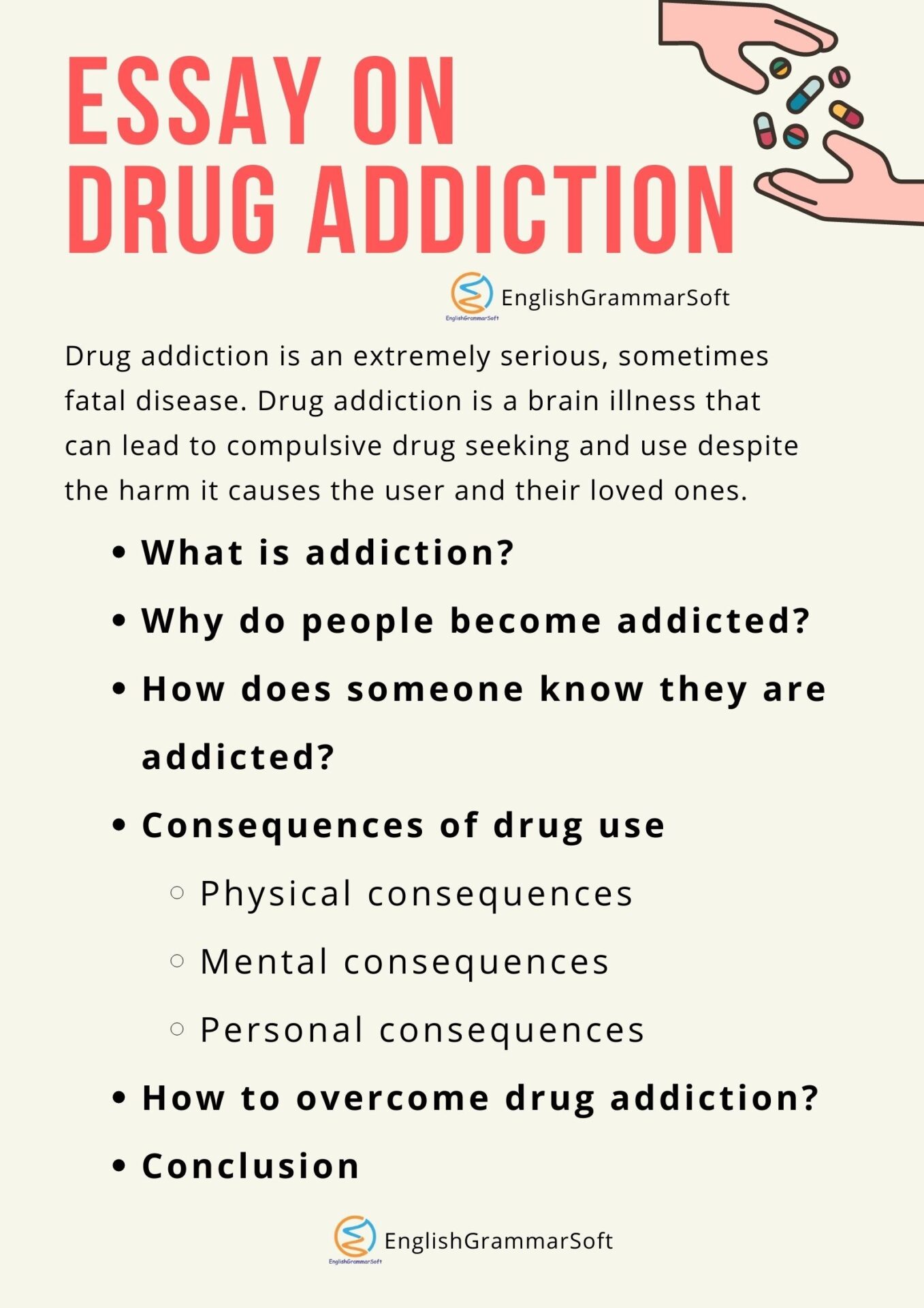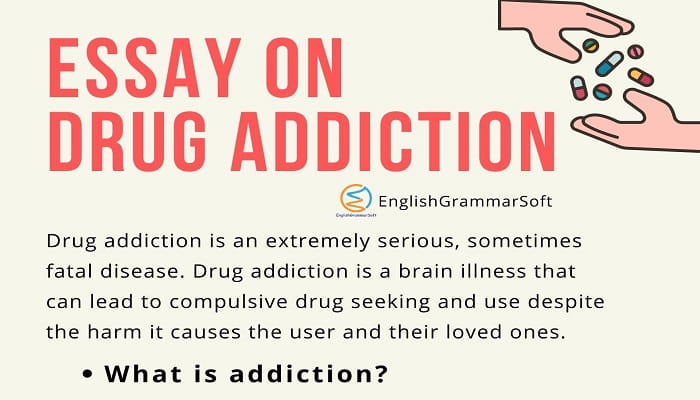Essay on Drug Addiction (1300 Words)
Drug addiction is a brain illness that can lead to compulsive drug seeking and use despite the harm it causes the user and their loved ones.
Drugs affect different people in different ways, but what they do have in common is that they change the way the brain works by affecting neurotransmitters.
Drugs cause these various neurotransmitters to be deficient or excessive, which leads to changes in behavior and mood and an inability to experience pleasure without drugs.
The earlier someone starts using drugs, the more likely they are to develop a substance use disorder. This is because early exposure increases the risk of addiction by up-regulating reward pathways and creating dependencies at a very young age.
Essay on Drug Addiction
Drug addiction is when someone starts craving or using drugs compulsively, even though they know it’s harmful to their health. Addiction to drugs like heroin, cocaine, alcohol, and nicotine are common in societies worldwide.
It can be hard to break out of this cycle because drug cravings can be intense and withdrawal symptoms make the user feel awful. Here, are some ways to stop drug addiction.
It is a disease that causes the person to continue taking drugs despite its harm. They cannot stop or regulate the use of drugs even when faced with negative health effects, social problems, or family issues.
It is a chronic disease that requires treatment and support in order to maintain abstinence. Drug addiction can be caused by changes in brain chemistry, emotional factors like depression, high levels of stress, and other environmental factors like pressure from friends or family members who are also addicted.
Drugs change how people feel about themselves; they can make them feel better about themselves when they are feeling down.
What is addiction?
While there is no exact definition of addiction, one of the most accepted definitions of addiction comes from the Diagnostic and Statistical Manual of Mental Disorders (DSM). Addiction is defined as “a chronic, debilitating condition that is characterized by compulsive drug seeking and use despite harmful consequences.”
The question of addiction has long been the subject of heated debates. Many people believe that addiction is caused by an individual’s lack of self-control and willpower, while others argue that addiction is a medical condition.
Both sides have compelling arguments, but society has largely embraced the latter view. This perspective claims that addiction is not just one behavior; it encompasses many behaviors that can be harmful to both oneself and society at large.
Despite the complexity of the issue, it is clear that there are ways for individuals to recover from their addiction without shame or stigma. Treatment providers need to ensure they are creating an environment where addicts feel safe and secure.
Why do people become addicted?
Addiction is not a choice; it is a disease that occurs when a person lacks the self-control to regulate compulsive drug use. One of the earliest symptoms of addiction is withdrawal, the physical pain that comes with the sudden onset of withdrawal from drugs.
When an addict tries to quit using drugs, the withdrawal symptoms can make this very difficult. Drugs produce high amounts of dopamine and norepinephrine.
Dopamine is a neurotransmitter that is normally released in the brain when a person is experiencing pleasurable feelings, such as after eating, sex, exercise, or a movie.
When someone becomes addicted to drugs, their dopamine levels drop. This can lead to feelings of depression, fatigue, and low self-esteem.
How does someone know they are addicted?
An addict is defined as someone who has an uncontrollable addiction to drugs, that they believe they cannot live without.
What are some signs of drug addiction? Many different signs can indicate that someone is addicted to drugs.
- Withdrawal symptoms: When you stop using drugs, the withdrawal symptoms can include:
- Feeling irritable or depressed
- Having trouble sleeping
- Feeling anxious
- Having trouble concentrating
- Having trouble concentrating at work
- Experiencing increased cravings for the drug
- Feeling stressed or sad
- Struggling with your thoughts
- Persistent drug use despite negative consequences. Someone may be tempted to use drugs again even after realizing how they are harming themselves and those around them.
Consequences of drug use
Drug addiction is a complex disease. Drugs change a person’s perception of their identity and that change can cause problems throughout their life. Some major consequences caused by drug addiction are discussed here.
Physical consequences
Physical consequences of drug addiction are problems with developing memories, insomnia, and loss of appetite. In addition, symptoms of addiction include excessive aggression, irritability, sleep problems, headaches, dizziness, diarrhea, vomiting, anxiety, and sweating.
Drug addiction can also cause other problems, including lethargy, anxiety, depression, fear, feeling of isolation, increased sensitivity to sunlight, abnormal bone structure, and hair growth.
Men are two times more likely to develop drug addiction than women. Also, Asians and blacks are more likely to develop drug addiction than whites.
Mental consequences
Drugs are habit-forming. When a person is first introduced to a drug, their body develops a tolerance to it.
The more they take, the less they need to have a high, meaning they need to take more of it in order to get the same effect.
As their tolerance increases, the need for the drug is reduced. Eventually, this process starts to cycle in reverse, and the user begins to feel symptoms of withdrawal when they do not have drugs.
Personal consequences
The user will experience intense withdrawal symptoms when they stop using. They will also experience a wide range of physical changes to the body.
Heroin users will experience muscle weakness and fatigue, and cocaine users will experience an irregular heartbeat and shaking.
Opiate, cocaine, and heroin use affects the heart. The constant drug use also damages the brain, interfering with cognitive functions and causing the user to lose interest in daily life.
The person may exhibit increasing behavior problems. In some cases, they will even be unable to care for themselves and may require hospitalization. In severe cases, a person who has lost the ability to think may commit suicide.
How to overcome drug addiction
Although it is impossible to fully recover from drug addiction without professional help, there are many ways to overcome it.
There is no simple cure for drug addiction. Recovery can be achieved through a combination of methods and time. The first and most important step is for the addict to stop using drugs.
While complete abstinence is not realistic, most people can do an abstinence program, meaning they can try to avoid all drugs but eventually give in and use something they can’t go without.
These programs are available online and in person. If you cannot find a program that is available in your area, there are plenty of online tools that can help you. For example, there are several recovery communities such as addiction centers that offer resources.
Exercise is a great way to improve your mental health and decrease the craving for drugs. Exercise releases endorphins, a chemical in the brain that makes you feel better. It also increases the activity of neurotransmitters and helps to relieve stress, which is what is behind the desire for drugs.
After using drugs for a long time, most people will begin to feel the effects of addiction in their bodies. This is usually a physical ache or a feeling of impending doom or anxiety.
Taking a few days off from using drugs can give the body a chance to recover from the increased use, though it may take a while before the ache goes away.
Conclusion
Starting with children and young adults will allow you to help the victim recover before they are affected by the effects of the drug.
When an addict shows signs of recovery you should implement an intervention and take the user to a drug treatment center.
Most drug treatment centers offer counseling, therapy, rehab and other kinds of programs that will aid in the rehabilitation process.
Most places that claim to offer help with drug addiction are under the guise of a drug rehab facility. Their treatment is in no way of any kind of high quality.
There are many people that are addicted to drugs and their desperate for a cure. These facilities do not actually offer any substance treatment. They only provide a place to live while recovering from drug addiction.

More on essays
- How to Write an Essay | Structure of Essay (Comprehensive Guide)
- Essay on Happiness is a State of Mind
- Essay on Education
- Essay on importance of education
- An Essay on School Life
- Essay on Friendship
- Essay about Anxiety and Stress
- Essay on Time Management
- Essay on 7 Cs of Communication
- Essay on 8 Business Functions
- Essay on Social Media and Its Impact
- Essay on Personality Development
- Essay on Leadership
- Essay on Importance of water in life
- Essay on Pollution
- Essay on Environment Protection
- Essay on Corruption
- Essay on Why Trees are Important in our Life
- 500 Words Essay on Nature in English
- Essay on Global Warming Causes and Effects
- Essay on Deforestation
- Essay on Smoking is bad for health
- A Short Essay on Mothers Day
- Essay on Health is Wealth






